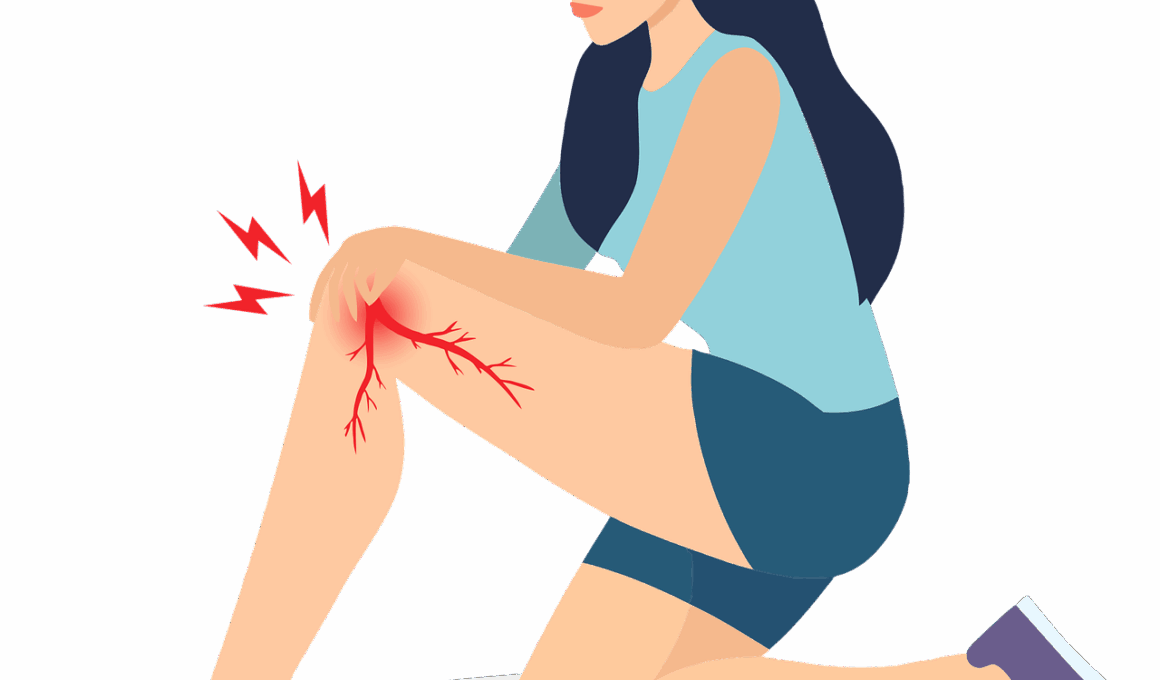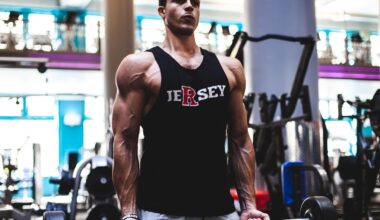Managing Muscle Soreness Between Bodybuilding Competition Training Sessions
Bodybuilding competitions place significant demands on the body, often resulting in muscle soreness following intense training sessions. Managing this soreness effectively is crucial for optimal recovery, allowing athletes to maintain performance levels and prevent injuries. A structured approach to rest and recovery can make a substantial difference in muscle recovery. Strategies may include active recovery, proper nutrition, hydration, sleep, and adjusting training intensity. Active recovery activities like light jogging or swimming can promote blood flow, speeding up the healing process. Nutrition plays a vital role as well; consuming a balanced diet rich in proteins, carbohydrates, and healthy fats aids muscle repair. Furthermore, adequate hydration ensures that the body remains efficient in eliminating toxins and repairing tissues. Sleep should not be underestimated; it is during sleep that the body regenerates muscle tissues. Implementing techniques like foam rolling and gentle stretching can also provide great relief. Athletes should listen to their bodies and adjust training schedules accordingly to avoid overtraining, which often leads to increased muscle soreness. Prioritizing recovery ensures that athletes can train effectively, resulting in better overall performances during competitions.
One of the most efficient techniques for managing muscle soreness is the incorporation of proper stretching routines before and after training. Flexibility exercises help to warm up the muscles and prepare them for the strenuous activity that follows. Post-workout stretches help in reducing muscle tightness and soreness, improving blood flow and promoting recovery. Dynamic stretching is recommended before training, while static stretching is most beneficial afterward. Having a consistent stretching protocol can positively influence muscle elasticity, thus decreasing soreness. Moreover, incorporating yoga or Pilates into a training regimen offers enhanced flexibility and relaxation, both aiding in recovery. Techniques like foam rolling or using massage balls can also be highly effective in alleviating tension in sore muscles. These self-myofascial release techniques help to break up adhesions, improve circulation, and allow for quicker recovery. Athletes should consider scheduled massages as they can promote relaxation, improve flexibility, and significantly decrease muscle soreness. Many bodybuilders find that alternating hot and cold baths mitigates soreness and reduces inflammation, offering a powerful tool for recovery. Strategies that prioritize stretching, foam rolling, and massages integrate well within a bodybuilding training schedule, ultimately benefiting recovery efforts.
Nutrition is a cornerstone of effective recovery techniques for athletes in bodybuilding competitions, especially for those experiencing muscle soreness. Fueling the body with the right nutrients after intense workouts allows for optimal muscle regeneration. Consuming protein within 30 minutes post-exercise is widely recommended, as it plays a vital role in muscle repair. Lean meats, fish, eggs, and plant-based protein sources are excellent options to include in a post-workout meal. In addition to protein, carbohydrates should also be consumed to replenish energy stores depleted during training. Carbohydrates act as a primary fuel source, replenishing glycogen levels in muscles and reducing the severity of muscle soreness. Incorporating fruits and vegetables into the diet provides crucial vitamins, minerals, and antioxidants to combat oxidative stress caused by intense workouts. Hydration remains paramount; drinking enough water before, during, and after training helps eliminate toxins from the body and supports overall health. Supplementation may also be beneficial; branched-chain amino acids (BCAAs) and omega-3 fatty acids have been shown to reduce muscle soreness and speed recovery. Integrating these nutritional strategies consistently promotes healthier recovery practices within bodybuilding training routines.
Active Recovery Techniques for Bodybuilders
Incorporating active recovery techniques can result in a marked reduction of muscle soreness for bodybuilders. Contrary to popular belief, complete rest is not the only effective recovery strategy. Engaging in low-intensity workouts like walking, gentle cycling, or swimming encourages blood circulation, which is crucial for muscle recovery. Such activities help to remove lactic acid buildup, effectively alleviating muscle soreness. Resistance training with lighter weights can also be beneficial during recovery periods, allowing for continued movement without overexerting muscles. Performing bodyweight exercises or low-intensity cardio is another excellent way to maintain mobility without increasing soreness. Gentle yoga sessions can also provide relaxation, stretching out tight muscles, and improving overall flexibility. Athletes may also incorporate mobility exercises, emphasizing joint stability and movement efficiency. Listening to the body is essential, ensuring that active recovery does not lead to further strain. For bodybuilders, scheduling active recovery days can allow for effective management of training volume and intensity, fostering long-term progress. The incorporation of these techniques enables athletes to recover better while also preparing the body for upcoming training sessions, maintaining overall fitness levels and performance during competitions.
Sleep is often underestimated as a recovery tool in bodybuilding competitions. Quality sleep duration and quality can significantly impact recovery and muscle soreness levels. During deep sleep, the body releases growth hormones which catalyze muscle repair processes and promote recovery. Ensuring that athletes get seven to nine hours of uninterrupted sleep is paramount. To enhance sleep quality, creating a conducive sleep environment is beneficial; low lighting, a cool room temperature, and minimizing distractions can promote better sleep hygiene. Incorporating a bedtime routine that includes calming activities, such as meditation or reading, can facilitate quicker sleep onset. Limiting caffeine and electronic device usage close to bedtime will further enhance sleep quality. Establishing a regular sleep schedule can help regulate the body’s internal clock, improving overall sleep patterns. Additionally, napping strategically after intense training can offset muscle fatigue and soreness. Athletes must recognize that sleep is as vital as their workouts. Prioritizing recovery through adequate and quality sleep will lead to improved performance levels, culminating in effective management of muscle soreness. It’s an integral aspect of a holistic approach to bodybuilding training that should not be overlooked or neglected.
The Role of Hydration in Recovery
Staying hydrated is essential for bodybuilders, particularly following grueling training sessions where muscle soreness is prevalent. Water is crucial for nutrient transport, digestion, and regulation of body temperature, supporting overall performance and recovery. Dehydration can exacerbate muscle soreness and hinder recovery rates, making it vital for athletes to monitor fluid intake consistently. Consuming an adequate amount of water throughout training and daily can help mitigate soreness. During exercise, electrolytes are lost through sweat, and restoring them can prevent muscle cramping and discomfort post-training. Drinking sports drinks or electrolyte-infused beverages can be beneficial, especially during intense workouts that last longer than an hour. Athletes should be mindful of hydration strategies by beginning hydration before feelings of thirst arise. Post-training hydration, paired with electrolytes, will help replace lost fluids effectively. Bodybuilders are encouraged to develop a hydration plan, ensuring they hit specific water intake goals throughout the day. Maintaining proper hydration is foundational for recovery success, directly impacting muscle soreness management and overall performance. Athletes are reminded that consistent attention to hydration must be paired with other recovery techniques for maximum benefits.
Conclusion: A Comprehensive Approach to Recovery
Implementing a comprehensive approach to recovery is vital for bodybuilders, especially when dealing with muscle soreness amidst competition training. This involves integrating various strategies such as nutrition, hydration, sleep, active recovery techniques, stretching, and possibly massage therapy. Each component will play a role in addressing and reducing muscle soreness, ensuring athletes recover optimally. Following a structured approach allows bodybuilders to maintain training consistency and performance levels, which is essential during peak competition seasons. Understanding the interplay between these elements creates a tailored recovery plan suited to individual needs. Athletes should experiment with different techniques, listening to their bodies in the process. Looking for the most effective strategies tailored to personal needs will enhance recovery efforts. Consistency in implementing these recovery techniques over time will result in better outcomes, allowing bodybuilders to push their limits effectively while reducing the impact of muscle soreness. Ultimately, successfully managing muscle soreness through a holistic recovery approach ensures more successful performances in bodybuilding competitions, pushing athletes closer to their goals while ensuring long-lasting physical well-being.
As bodybuilders prepare for competitions, the journey extends far beyond the gym. Managing muscle soreness effectively presents an opportunity for athletes to optimize their performance. Engaging fully in the recovery process will empower bodybuilders to confront challenges that arise during demanding training sessions. By prioritizing rest and integrating multi-faceted recovery strategies, the path toward success becomes clearer. Envisioning training as just one part of the equation inspires athletes to respect their bodies and prioritize wellness. Encouraging a lifestyle that balances strenuous workouts with adequate rest can create a foundation for sustained progress in bodybuilding. In turn, athletes who apply these concepts are more likely to see impressive results, progressing through their training cycles and enhancing performance. Mindfulness and commitment to recovery, nutrition, sleep, and hydration all intertwine, building a holistic approach that supports strength and competitive readiness for bodybuilding competitions. Each workout, each soreness, and each recovery night contributes to the overarching goal of unparalleled performance when it matters most. Building muscle and competition success is a journey where the integration of recovery techniques stands as a testament to an athlete’s dedication and resilience.


